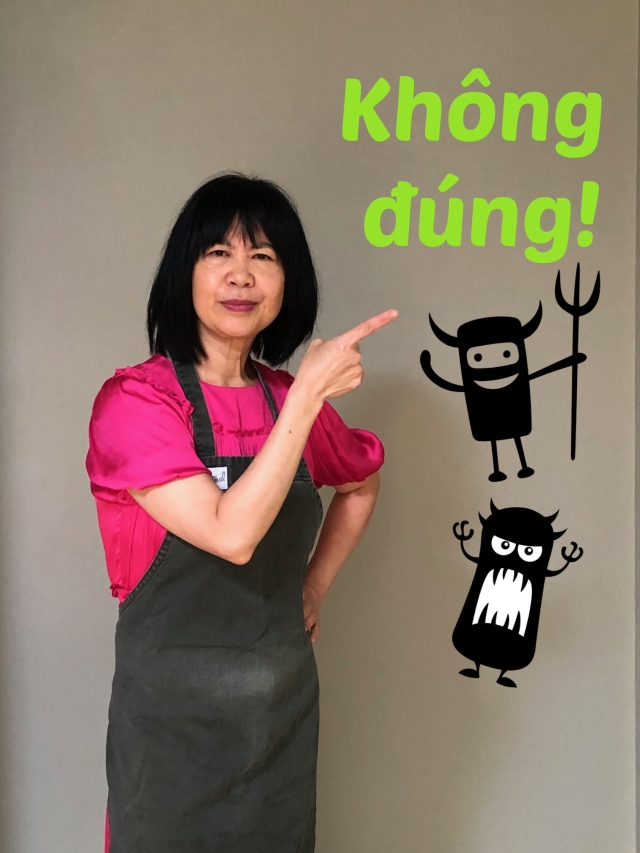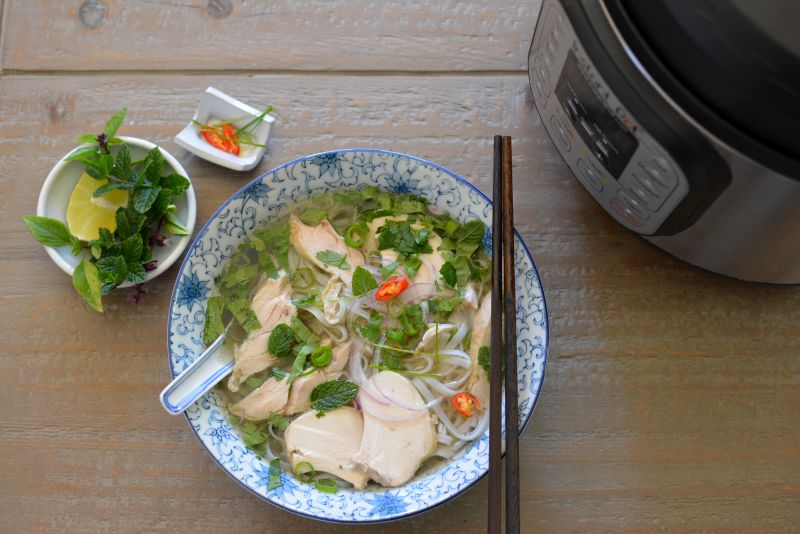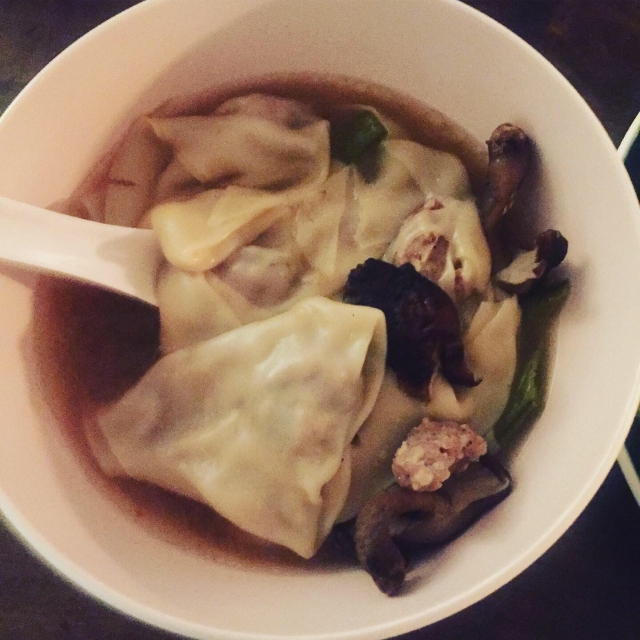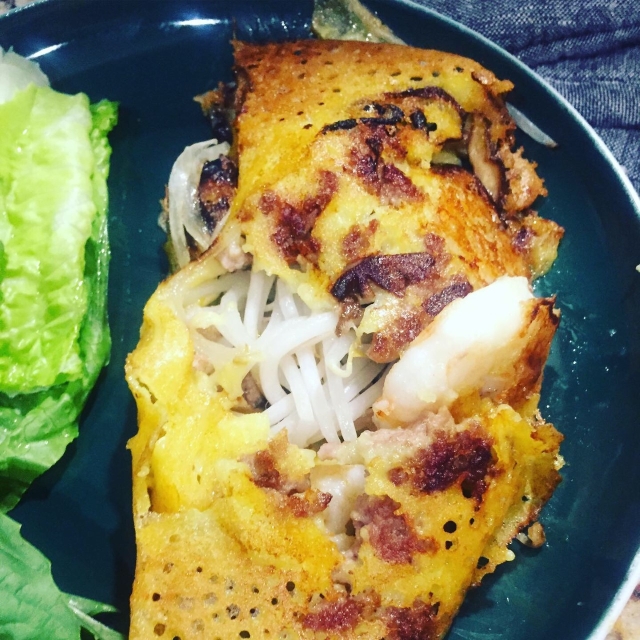
There’s a phrase in Vietnamese that has plagued me since I started my professional food writing career: “Không đúng” (“Cohng doong”). Those two words literally mean not true or incorrect, but they also imply that you’re morally wrong. If someone says that to you, it’s a slap in the face, a major shame, an insult to your parents and maybe even your ancestors.
When my first book came out in 2006, I feared older Viet people coming at me, pointing a finger and screaming, “Không đúng!” So I worked hard to make sure I paid homage to my heritage and history, that I proofread my book (with my dad’s help) to make sure all the Viet spelling was đúng (correct). At the same time, I couldn’t deny the fact because I came to this country at age six, I was Vietnamese-American.
I often speak Vietnamese like I’m a third grader, despite my being able to read Viet-language cookbooks and recipes like a pro. As with any profession where you’re called an ‘expert’, you fear not knowing enough or not knowing anything — that’s called the imposter syndrome. And when you focus on a specific cultural subject, what you fear most is your own -- family members, people from the community, judging you.
When I was growing up, I observed many judgemental people condemning others they didn’t agree with by slinging “Không đúng!” in their face, at a TV screen or just in conversation. My parents occasionally used the phrase to reprimand us in a heated argument.
What’s Right about Not Being Right
Setting out to write Vietnamese Food Any Day, I again feared the onslaught of “Không đúng!” reactions that would slam me for being culturally inauthentic (how can supermarkets support solid Viet cooking?) or being an Americanized, Westernized sell-out.
To rationally extract myself from that wormhole of anxiety, I leaned on what I gleaned in the motherland: People in Vietnam have long had their feet in tradition and evolution. Many are curious and many are creative. For example, I was incredulous about a pho cocktail in Hanoi but it was good, and I felt liberated to include pho-appropriate cocktails in The Pho Cookbook. After noting pressure cookers for sale in Vietnam, I wrote recipes for them in the book and later included an Instant Pot chicken pho recipe plus guidance on adapting the book’s recipes for the Instant Pot.

Years ago, when I asked a wet market vendor if she hand chopped her daily piles of lemongrass, chiles and shallot for customers, she responded, “No sister, I use a machine!” There are people who may judge her as being “Không đúng!” but I bet there are many more who embrace her approach.
Time and Place as Culinary Seasonings
My 86-year-old mom doesn’t cook the way she did 45 years ago when we came here. She shops at supermarkets and Trader Joe’s, and enjoys their neighborhood convenience. She uses small and large food processors to save prep time. Mom still cooks from scratch and shops at Asian markets when needed! She scans YouTube and tries out new techniques and ingredients to gauge their performance against old foodways. She’s an excellent cook because she’s ventured beyond being “Không đúng!” to experiment.
I like to think she’s mellowed and relaxed with age, but her migration from her birthplace in northern Vietnam to Saigon to California signal a willingness to adventure and reinvent. She’s old-fashioned but not too.
I think of my mom and others I’ve met during my career who’ve taught me to drop some of my cultural baggage and liberate myself from the tyranny of “Không đúng".
Cooking Up Personal Authenticity
The problem with “Không đúng!” is this: It’s an extreme position. It’s judgmental and being judgy is easy. People who dole out the phrase with ease often think they’re taking the high road, but what’s actually hard is being thoughtful. In the kitchen, that means being khéo — cooking with intention, thought, and care. That means developing a personal culinary authenticity that reflects heritage, culture and personal experience. To my best ability, I try to help cooks pave their own paths to culinary liberation.
During the past few months, I received feedback on Vietnamese Food Any Day (VFAD) from two American-born Vietnamese-American women.
Sylvia emailed the letter below and sent images that I’ve included on this post.
Hi Andrea,
My apologies for the unsolicited email but I wanted to let you know how much I love VFAD. My parents are ethnically Cantonese but were born and raised in Saigon. I was born in America after they both came to the States and met in Philadelphia.
I really enjoyed cooking and find it a fun challenge to cook more complicated American/European dishes but for whatever reason, I’ve always felt intimidated or scared to cook Vietnamese dishes. I think I was worried I would make something that was westernized or not authentic enough, so I always reserved eating Vietnamese and most Cantonese food when eating the meals prepared by my mom or at restaurants.

When I was younger, I used to try to be as “American” as possible, but the older I get, the more I find myself wanting to connect with my parents’ culture and heritage. VFAD has helped me do that through cooking, and I find it so satisfying cooking and eating such familiar tastes.

Thank you for creating such a wonderful cookbook. I follow you on Instagram and look forward to trying even more of your recipes. Here are a couple photos of the meals I’ve made from VFAD.
Best,
Sylvia L.
I teared up reading Briana’s note because I have felt similar anxieties:
Before this cookbook, I had an underlying anxiety that kept me from attempting more Vietnamese style cooking. When I was maybe 8 or 9 years old, I worked for hours to make one egg roll for my mom when she came home from work. I didn’t know what I was doing but I wanted to give it a try. After full-hearted attempt, all my mom could say was “you used the wrong noodles.”
Over the years I’ve heard Vietnamese strangers and relatives chastise me for not knowing how to speak Vietnamese or not knowing how to cook things the ‘right way’. It’s even come to a point where at nail salons I say I’m half Thai and Mexican instead of full Vietnamese. I even have a cousin who tells me I cook chao [rice porridge] the wrong way because I don’t use broken rice. At the end of the day, rice porridge is rice porridge! And mine is damn good!
Since its arrival, your cookbook has been a humble guide in helping me dive into the flavors I grew up with. I no longer have to feel like everything needs to be perfect in order for me to cook bun thit nuong or throw fish-sauce marinated chicken on the grill. Thank you for making it possible for me to relax a little and finally have fun with Vietnamese food! The day we cooked slashed chicken and turmeric rice, my husband exclaimed he could eat like that any day. 😉
-- Briana K.
It's natural to feel intimidated when making food from unfamiliar cultures. For people of Vietnamese descent, there’s often a looming fear of doing it incorrectly. (I imagine this anguish isn't just a Viet thing.)
When checking out a Viet dish, I focus on whether it tastes good. If a cook has a new approach (it doesn't matter to me if the cook is Viet or not), then I investigate to figure out why and how.
There are countless dishes that I’m unfamiliar with (like Kien Giang fish and shrimp noodle soup), that I want to understand. I’m not a “Không đúng!” kind of person because that’s a phrase that hurts much more than helps.

















Jeffrey Cooper says
Wonderful story. Thank you for sharing such a deep rooted belief. Gives me a new perspective on cooking.
Andrea Nguyen says
Thank you, Jeffrey! Cooking is an emotional thing.
John says
Love your humility, honesty and boldness Andrea! Applause!!!
Andrea Nguyen says
Thank you, John!
Anh says
I am with you Andrea! I don’t let ‘khong dung’ stand in my way when it comes to cooking or anything else for that matter. As long as it is legal, moral and it does not harm anyone, I am plowing forward! Needless to say, my family, my husband’s family and friends all enjoy my cooking.
I always enjoy reading your blog. As famous and popular as you are ( yes, you are!), there is a certain humility and contagious enthusiasm coming from you that make us sit up and take notice and buy your cookbook and cook.
Thank you for being you and the immense effort you put in to share the Vietnamese cooking with kids like me who came to US when we were young, to the people who want to refresh their Vietnamese cooking chop and to the world!
Andrea Nguyen says
Delighted to be in the same boat with you on these issues, Anh! Let's phản đối không đúng in our own ways.
I'm so happy that you cook and feed your family and friends with lots of joy. I appreciate your showering me with applause but I am just me.
Thanks for such a thoughtful reaction! Rock on!
Danielle Lin says
You can't please everyone. I love how you make Vietnamese cooking accessible to the American cook. Keep going!
Andrea Nguyen says
Truth, Danielle! Thanks for the encouragement.
Lori Keller says
I love that you mentioned imposter syndrome. I listen to Code Switch all the time and they talk about it regularly. I'd love to hear you on their show and to talk about your new cookbook.
Andrea Nguyen says
We all go through this on one level or another, Lori. I guess I should have spoken up sooner! I adore Code Switch on NPR!
Dianne says
I appreciate your comments and I wish to say that I remember the many Vietnamese people who arrived here and stayed at the Marine Corps base in tents in Oceanside. I admired their strength and courage. Later I sold a car to two young men who must have been in that camp; they said they could fix 'any car' as I told them honestly it had some problems. They brought a paper bag of cash to the sale and , again, I thought..these guys are going to make it! I was just out of the Navy and noticed the development of restaurants , markets, repair shops in my neighborhood in San Diego all helmed by these wonderful people who had been through so much. Cheers and gratitude for everyone who gets through the mess we are in right now. I am very sad currently that my favorite Vietnamese restaurant has closed permanently. Anh, the lady that tailored clothing for my family for 20 years has retired. Lets all hope for happier times.
Andrea Nguyen says
Dianne -- I was at that camp at Camp Pendleton! Thank you for welcoming Vietnamese people to America with such warm generosity. The folks you met I'm sure were very grateful to have met you. What a great story.
Krystal Nguyen-Harush says
Your writing and the letters resonate with me. I love Vietnamese food and am Viet-American myself. When you wrote that you "speak like a third grader," that stuck out to me because I feel the same way about my language level. I felt shamed growing up for speaking Vietnamese improperly, and never fully embraced it. Now, as a 31 y.o. trying to teach myself Vietnamese, I feel a longing to close the cultural and language gaps. I've asked my mother for help but she keeps sticking with English for some odd reason. The way you write and share your stories motivate me. So glad I found your blog years ago!
Andrea Nguyen says
Thank you so much, Krystal. There are many of us in this same exact boat! Glad to share the experience to help one another move forward. Take care.
Lizzie P says
Lovely story. My mother is Vietnamese and my father is Filipino but us kids were born in the States so by default we are American to our relatives from the motherlands but not quite "American" to people here. In college I took Vietnamese to connect to my mother's roots. When I called home to practice speaking with her she cried; when they immigrated in the 70's it was frowned upon to speak your native language and she wanted us to assimilate. In the end she was proud of how I picked up some of the language even though it was a different dialect! Now as an adult I realize the value and beauty in finding connections to our culture, even if we weren't born in that country or fluent in the language. I find myself connecting with your recipes because they are so approachable and allow for so many substitutions from local supermarkets if I don't feel like driving 30 minutes to a Vietnamese market. My husband is white American and our kids are hapa but it's important to me that they also find your carmelized pork crumbles and bun thit nuong as often in our house as mac and cheese and chicken tenders (these things are loved equally in our home). Even though I have a background as a professional cook, Vietnamese cooking was previously indimidating to me! Thank you for the work that you do! And I have also shared some of your books and recipes with my mom as well and she approves.
Andrea Nguyen says
Wow, what a story, Lizzie! I wish I could have taken Vietnamese in college. (I studied Spanish and Mandarin instead.)
We live, cook and eat in a multi-dimensional state and that's not just okay, that's reality. That's why I'm skeptical of purists. Knowing the fundamentals is important but abiding by them is difficult in modernity. Authenticity lies in your heart, not in someone else's judgment of you.
Thank you for writing and sharing your family story.
Lisa RR says
We are so often our own worst enemy, right?
Your clear instructions and encouragements to your readers will help us be more confident about trying new spices, new techniques, new dishes.
It takes time to get to that comfort level ... and to be able to adapt a recipe.
thanks for your hard work!
Andrea Nguyen says
We are! And we need to realize that we can't control what other people think or say. But we can control what we think and how we perceive them! Thanks for taking time to comment, Lisa!
Sara Deseran says
Andrea, love this so much! It's honest. And it doesn't pander to the idea that "authentic" (whatever that means) is always best. Cuisine morphs and shifts with time and border crossings and things as basic as what's in a cook's cupboard. (To that effect, I'm gonna tell you my new favorite discovery is caprese salad tossed with chile crisp! For no other reason than the ingredients were all there one day, calling my name.)
As a white woman who loves pretty much love every cuisine more than the Scandi-English-whatever cuisine of her ancestors, I feel some version of imposter syndrome when I cook most everything. However, when I let go of the fear of the judgement of cultural appropriation, I do think that the people who are farthest from growing up with a cuisine to call their own can fall in love with it in a way that's anew, with a different kind of enthusiasm that can't be had by someone for whom it's always been comfort and everyday. I have so much envy for those who have that cultural cuisine to hold onto, but I also feel blessed to have fallen for so many foods that aren't mine to claim. And Vietnamese, in all its forms, is certainly one of them. And you've been one of my go-to teachers.
Keep up your enthusiasm for delicious food. Because at the end of the day, that's what matters the most.
Andrea Nguyen says
Thank you, Sara, for sharing your experience and feelings. Your comments mean a lot. A compliment!
Von says
I was 10 when my family found refuge in America. I've been on the receiving end of '“Không đúng!” so often that it should be my nickname...heehee 🙂
This is a wonderful post. Your genuine love of VN food and desire to share that passion really comes through in your blog and cookbooks (which are fantastic!). My pet peeve is people who complain about a dish because 'it's not authentic" or think that if you are not a descendent of the culture of the food you're cooking can't cook that food right.
As an example, I'm not Mexican but i think my guacamole is da bomb 🙂
Rachel says
I'm an American, but of mixed culture. Each of my grandparents were a different ethnicity and all are immigrants except one. Spanish, Israeli, Native American, and German. And grew up in the Southeast on the coast. My husband is Indian and has only been in the USA about 4 years. It's safe to say I've been exposed to many types of delicious food! But being a mish mash person, I've never been ingrained with demands of authenticity. I'll use a garlic naan as the crust for a vegan buffalo chicken pizza. I'll make authentic hummus and eat it with saltine crackers. I make paella in the "wrong" pan, a cast iron skillet, and without seafood. I put mustard in mostly anything, at least a little squirt of dijon. I use coconut oil instead of olive oil to cook my caramelized onions for mujaddara. I am fortunate to have been raised to believe that you can use something as an inspiration without being tied to authenticity. As long as it tastes good, it is perfect! And that's really the American way. There's no wrong way here, we're called a melting pot for a reason. Unless you're talking about mac and cheese, then yes there's only one way to do it and all I'll say is it doesn't start with a roux! Lol.
Andrea Nguyen says
Thank you, Rachel! Yes, we're a melting pot, a fruity, funky salad in America. It makes things more interesting and delicious.
Rupert Groesbeck says
It's hard to say